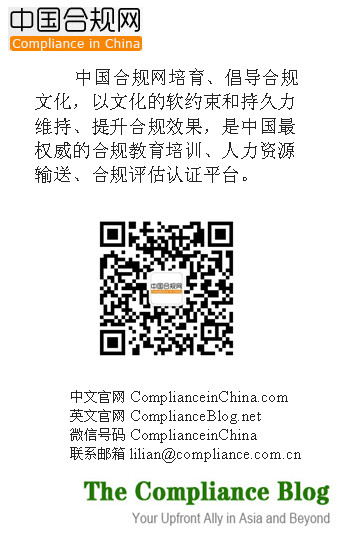With the increased requirements of various companies and enterprises for compliance, “Compliance in China” (www.ComplianceinChina.com or www.compliance.com.cn) launched an Internet survey titled “What Are Your Compliance Requirements” on April 14, 2013 among its members – the members are mostly multinational and domestic companies with obvious requirements for compliance. By October 27, 2013, there were 44 people participating in the survey, hereinafter is the summary of the survey result:
-Most surveyed companies set positions for compliance.
-The compliance functionaries are mostly female.
-Every industry has compliance requirements.
-The Chinese anti-bribery law, the FCPA, and the UK Bribery Act are the top concerns on compliance.
-The inaccurate understanding of laws and regulations by law-enforcers is the biggest difficulty in execution of compliance work.
-Participating companies have their compliance tools, but lack constant compliance training.
-A small majority of participants have received a moderate training on compliance, but some of them have not received any compliance training.
-Compliance officers have been mostly trained by inside trainers, online-trainers and outside trainers.
-Most participants wish to receive newsletters on compliance.
-Bilingual Chinese and English newsletters are more welcome than a single Chinese or English newsletter.
Hereinafter is the full report:
1. Most surveyed companies set the positions for compliance.
Regarding the question “what is your position?”, 31 participants chose “Compliance officer” accounting 70.45%. Four, 8, 1 and 0 persons respectively selected “Administrative manager”, “In-house counsel”, “Finance manager” and “Business Manager”, which respectively accounts for .09%、18.18%、2.27% and 0%.
Because the position of “Compliance officer” is in conflict with other positions in terms of executing the functions of compliance, the position for “Compliance officer” shall be independent from other positions (even the position of “In-house counsel”). Therefore, if a company sets up an independent position for “Compliance officer”, it means that such a company attaches great importance to the functionary of compliance. The 70.45 percentage indicates that the position of “Compliance officer” is becoming more and more important.
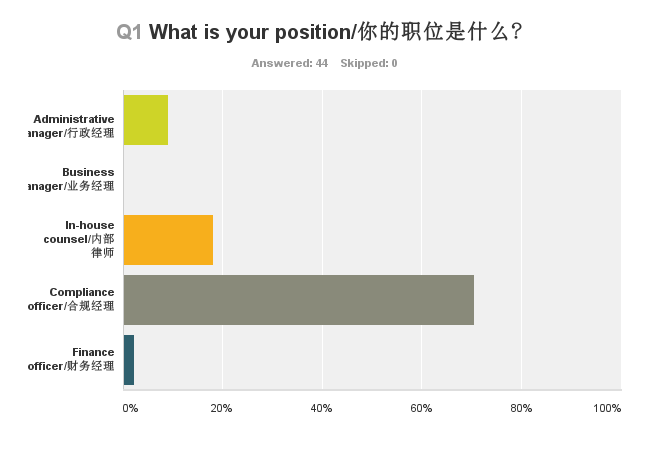
2. Most compliance functionaries are female.
As for the observations of the most people, compliance officers are mostly female, which is now verified by this survey. Among all of the 44 participants, 30 are female accounting for 68.18%; 14 are male accounting 14%.
Further research is needed on why the most compliance officers are female.
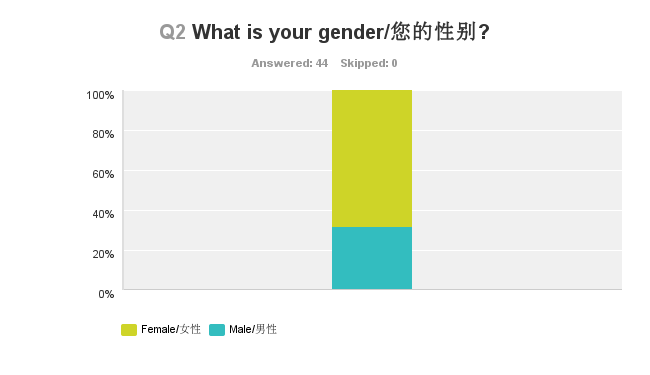
3. Compliance requirements are with every industry.
Regarding the question “What is the industry of your company”, among 44 participants, 18 selected “manufacturing” accounting for 40.91%; 6 selected “trading” accounting for 13.64%; 17 selected “services” accounting 38.64%; 9 selected “pharmaceuticals and medical devices” accounting for 20.45%; 3 selected “medical services” accounting for 6.82%; 2 selected “food and beverage” accounting for 4.55%; 1 selected “alcohol” accounting for 2.27%; 3 selected “constructions” accounting for 6.82%.
Thirteen participants broke down their industries into telecommunications (2 participants), finance and banking, environment/energy, multiple, biotechnology, oil and gas (2 participants), EMS, insurance (2 persons), consulting, and finance leasing.
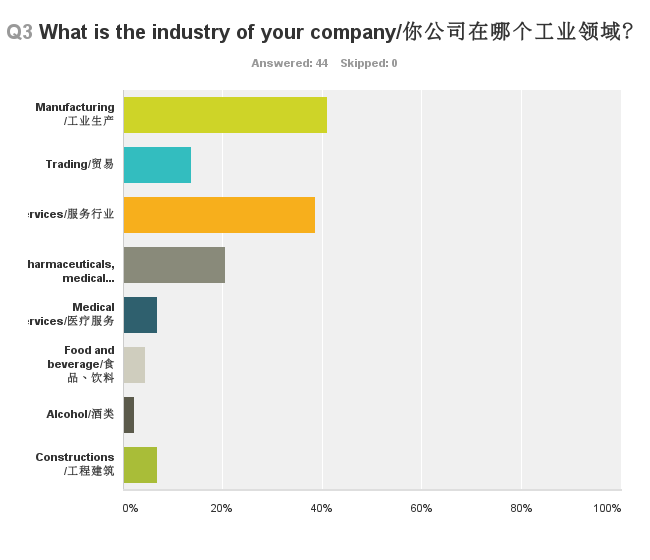
4. The top compliance concern is Chinese anti-bribery law, and then the FCPA and UK Bribery Act.
Among the 44 participants, 40 listed “Chinese anti-bribery law” as their top compliance concern accounting for 90.91%. Thirty and 25 participants respectively selected the FCPA and UK Bribery Act, respectively accounting for 68.18% and 56.82%.
It appears that China’s Anti-Monopoly Law plays a threatening role in compliance, 22 participants selected “Anti-Monopoly Law” accounting for 50%. There were 18 and 17 participants respectively selecting “Privacy” and “Anti-Money Laundering”, which respectively accounts for 40.91% and 38.64%. In addition, 7, 5 and 2 participants respectively selected “Foreign exchange,” “Environmental protection” and “Food safety” respectively accounting for 15.91%、11.36% and 4.55%.
Five participants respectively described their top compliance concern as follows:
-Anti-unfair competition law; U.S. export control
-Telecommunication
-Rapidly changing regulations
-Fraud
-The concerned regulations on finance leasing such as the registration, mortgage and reclaim of mortgaged equipments and risks on bonded areas
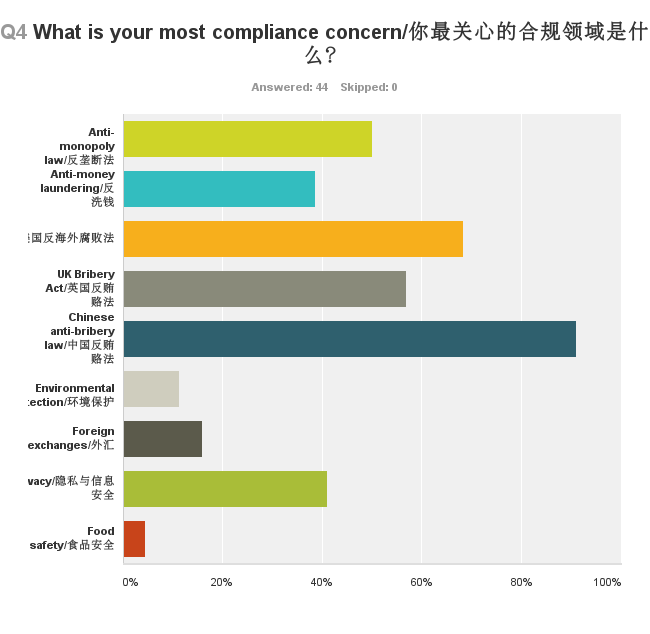
5. The biggest difficulty for job in compliance is “the inaccurate understanding of Chinese law by law enforcement officials”
Forty two of 44 participants responded to the question “what is the largest difficulty you ever encountered on compliance in China”. Twenty four of them selected “Non-accurate understanding of law by law-enforcers” accounting for 57.14%. Eighteen of them selected “Legislative chaos” and “Unfair law enforcement” respectively accounting for 42.86%. Thirteen participants selected “Bad law” accounting for 30.95%.
Seven participants (accounting for 16.67%) listed their own biggest difficulty, which are respectively:
-Cultural difference
-Non-compliance with law by clients, suppliers and competitors
-Focus on company internal management
-Awareness and sense (2 participants)
-Different provinces have different standard
-Administrative inaction and abuse of administrative discretion
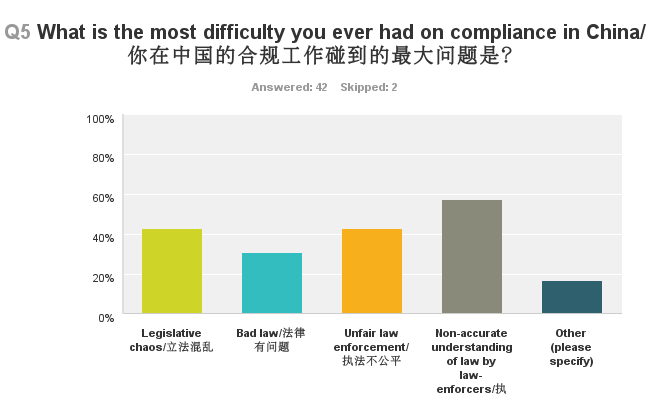
6. All companies have their own compliance management tools, most of which lack constant compliance training.
Forty one participants selected “Code of business conducts” as their compliance management tool accounting for 93.18%; 30 selected “Gift and entertainment guidance” accounting for 68.18%; 16 selected “Guidance on dealing with governmental officials” accounting for 36.36%.
Two participants selected others. One selected the RDPAC code – the code of China Association of Enterprises with Foreign Investment R&D-board Pharmaceutical Association Committee; another selected “Training on laws and internal policies.
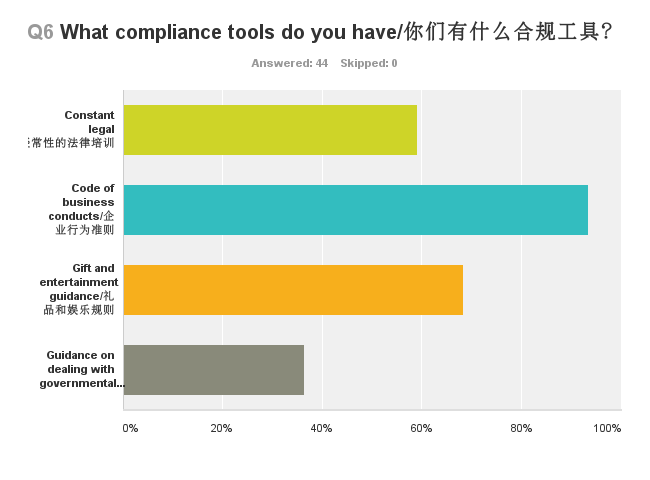
7. A small majority compliance officers believed that they have received a moderate amount of training, but some haven't received any training at all.
Among 44 participants, 19 of them received “a moderate amount” of training accounting for 43.18%; 14 received “a little” training accounting for 31.82%. Five and 4 received “a lot” and “a great deal” of training, which respectively accounts for 11.36% and 9.09%. Two did not receive any training at all, which accounts for 2%.
A participant said that he or she received an “on-line training by company and ethics alert”.
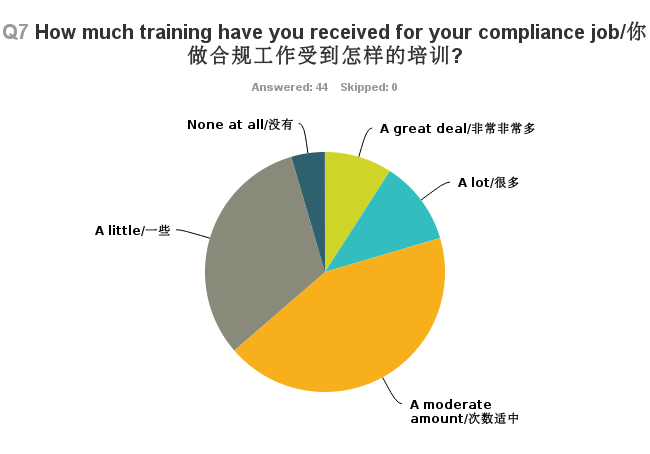
8. Regarding the question of who trained you (i.e., compliance officers), by the percentage from high to low, they are “Internal managers”, “External managers” and “Online trainings”.
Twenty four participants selected “Internal managers” accounting for 61.54%; 18 selected “Online trainings” accounting for 46.15%; and 13 selected “External managers” accounting for 33.33%.
Six broke down their training sources, which are respectively:
-HQ
-External lawyers
-SEC and DOJ
-Varies
-Previous job etc.
-Business practice organization
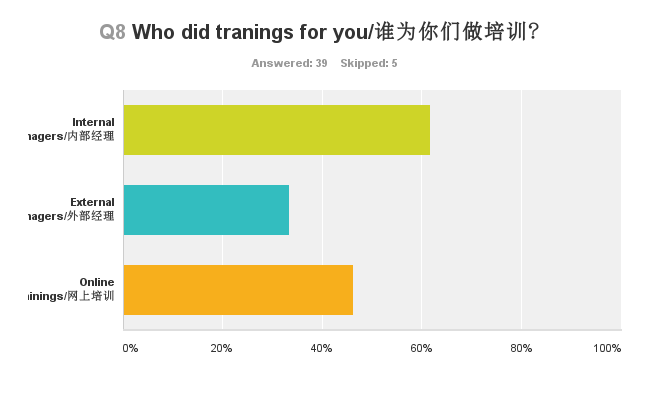
9. Most participants wish to receive compliance newsletters.
Forty one wish to receive compliance newsletters accounting for 95.35%; two did not, accounting for 4.65%.
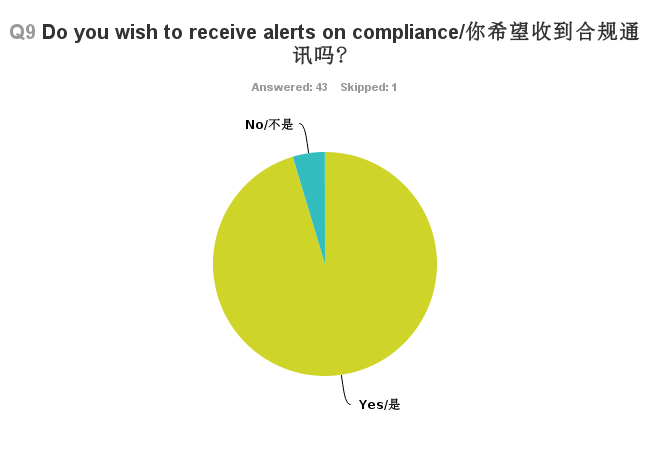
10. A bilingual English and Chinese newsletter would be mostly welcome.
Forty one participants wish to receive compliance newsletters bilingually in Chinese and English; 2 selected English only accounting for 4.55% while 1 selected Chinese accounting for 2.27%.
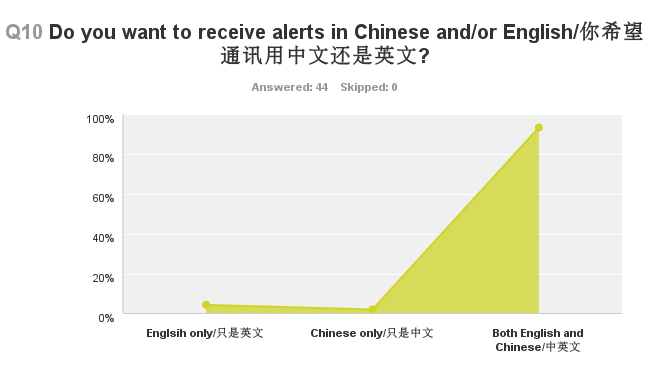
If you have any questions, please contact lilian@compliance.com.cn. The Chinese version is available upon request.
